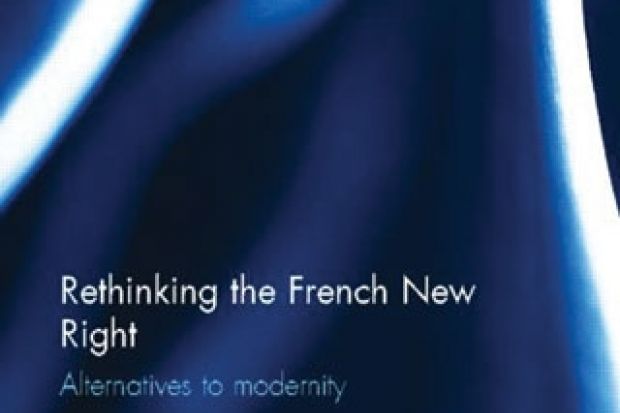Matthew Feldman, co-director of Teesside University’s Centre for Fascist, Anti-fascist and Post-fascist Studies, is reading Tamir Bar-On’s Rethinking the French New Right: Alternatives to Modernity (Routledge, 2013). “An ambitious companion to Bar‑On’s first work on the increasingly transnational Nouvelle Droite. He lucidly examines ND’s hydra-headed view on modernity, parsing several rightist revolutionaries – from Italy’s Tarchi to Russia’s Dugin – ‘metapolitically’ contesting liberalism’s cultural hegemony in Europe. Had this enlightening monograph appeared a generation earlier, Telos and other New Lefties would have resisted Alain de Benoist’s overtures…surely?”

Dennis Hayes, professor of education, University of Derby, is reading Brian Winston’s A Right to Offend (Bloomsbury, 2012). “This encyclopedic account of ‘the long, and often bloody, history of the struggle’ for free speech aims to dispel ‘the shadow of the fatwa’ that spread from Salman Rushdie, and all those involved in the publication of The Satanic Verses, until it covered every writer and academic. That shadow persists at universities, where safe, inoffensive speech is now required and where most academics delude themselves about having academic freedom because self-censorship is the norm.”

Karen McAulay, music and academic services librarian, Royal Conservatoire of Scotland, has downloaded Graham G. Davies’ The Presentation Coach: Bare Knuckle Brilliance for Every Presenter (Kindle, 2010). “This book’s title accurately reflects content and approach – a straightforward, punchy introduction to effective preparation for attention-grabbing public speaking. Davies’ experience ranges from the Cambridge Union Society, through practice at the Bar, to extensive coaching. His terminology is a bit zany (‘Preparation Pipeline’, ‘Micro-Statement’, ‘Spike’), but bear with him – this is readable and full of sound advice.”

June Purvis, professor of women’s and gender history, University of Portsmouth, is reading Margaret Leask’s Lena Ashwell: Actress, Patriot, Pioneer (University of Hertfordshire Press, 2012). “Largely neglected in theatre and suffrage history, Ashwell (1869-1957) regains the limelight in her first full-length biography, which reveals her important roles in the advancement of women in the English theatre and the formation of the National Theatre. Her life after the Actresses’ Franchise League was devoted to a different kind of reform, making the theatre accessible to all.”

Sara Read, lecturer in English and Renaissance Society postdoctoral fellow, Loughborough University, is reading Josephine Tey’s The Daughter of Time (Arrow, 2009). “The resurgence of interest in Richard III has led to bookshops re-promoting this classic, first published in 1951. The characterisations haven’t aged well, but the conceit of an incapacitated detective investigating the disappearance of the Princes in the Tower from his hospital bed is superb. The presentation of a case exonerating Richard is compelling.”
Register to continue
Why register?
- Registration is free and only takes a moment
- Once registered, you can read 3 articles a month
- Sign up for our newsletter
Subscribe
Or subscribe for unlimited access to:
- Unlimited access to news, views, insights & reviews
- Digital editions
- Digital access to THE’s university and college rankings analysis
Already registered or a current subscriber? Login
